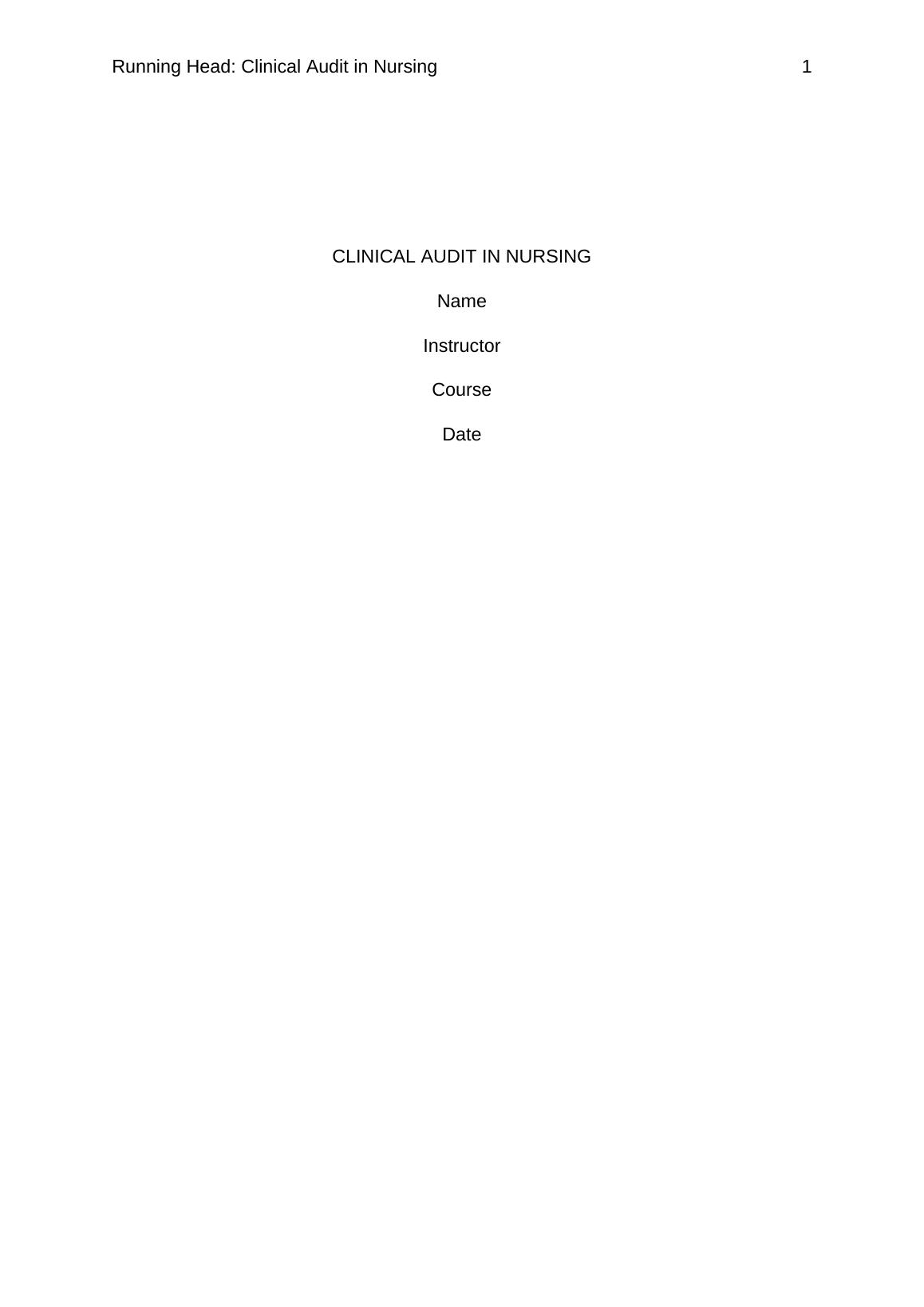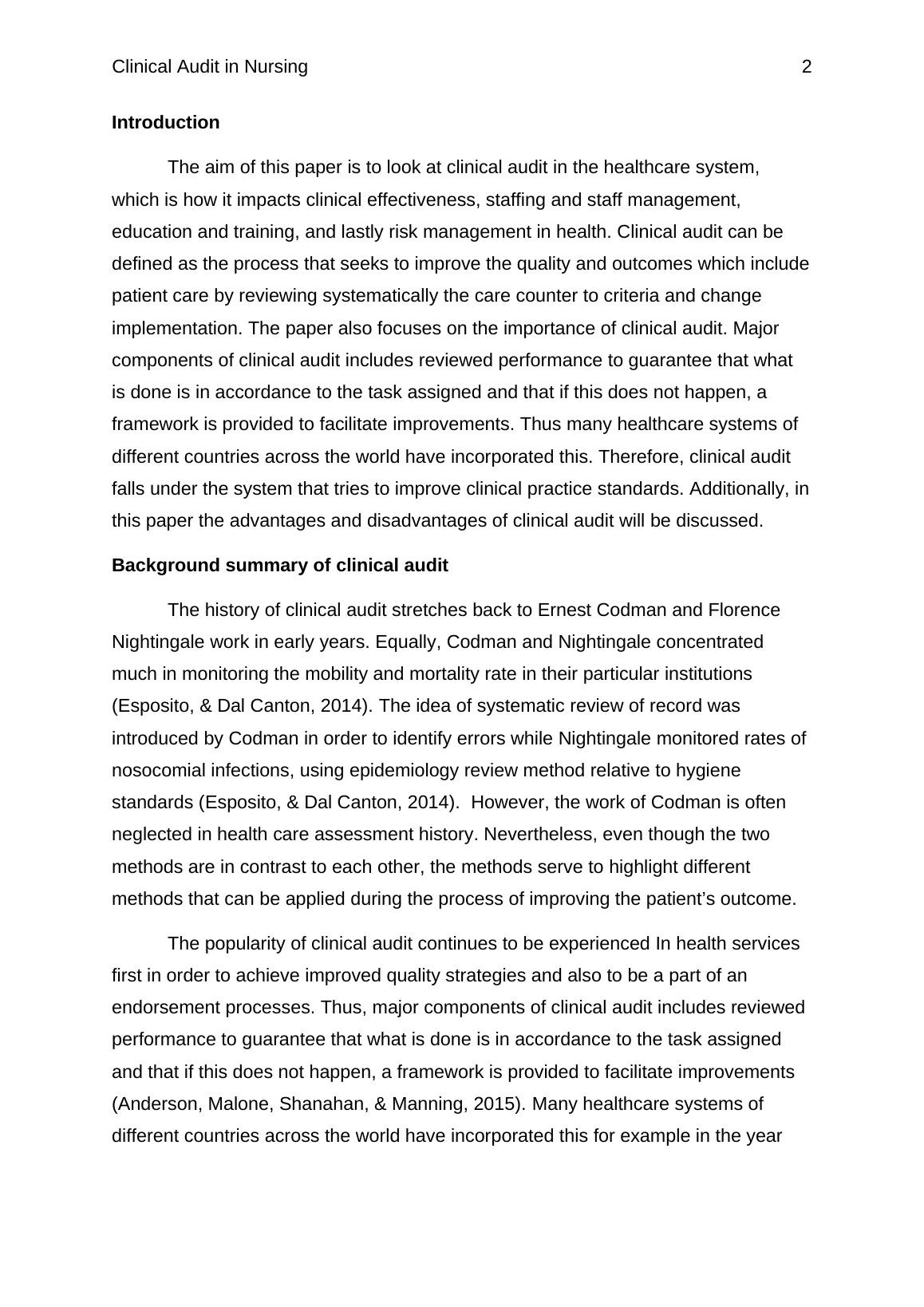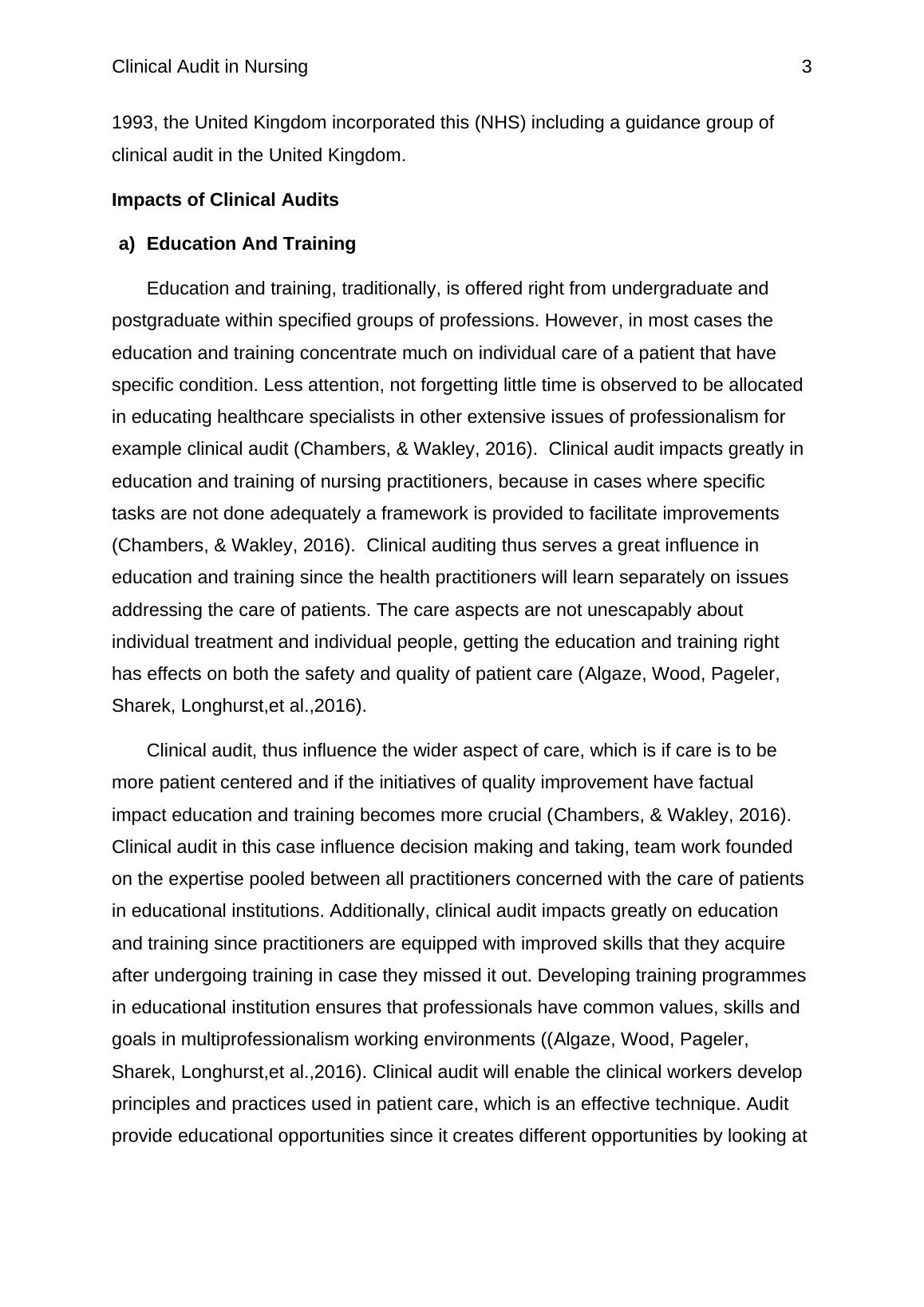Clinical Audit in Nursing
Added on 2023-04-11
9 Pages2621 Words324 Views
Running Head: Clinical Audit in Nursing 1
CLINICAL AUDIT IN NURSING
Name
Instructor
Course
Date
CLINICAL AUDIT IN NURSING
Name
Instructor
Course
Date

Clinical Audit in Nursing 2
Introduction
The aim of this paper is to look at clinical audit in the healthcare system,
which is how it impacts clinical effectiveness, staffing and staff management,
education and training, and lastly risk management in health. Clinical audit can be
defined as the process that seeks to improve the quality and outcomes which include
patient care by reviewing systematically the care counter to criteria and change
implementation. The paper also focuses on the importance of clinical audit. Major
components of clinical audit includes reviewed performance to guarantee that what
is done is in accordance to the task assigned and that if this does not happen, a
framework is provided to facilitate improvements. Thus many healthcare systems of
different countries across the world have incorporated this. Therefore, clinical audit
falls under the system that tries to improve clinical practice standards. Additionally, in
this paper the advantages and disadvantages of clinical audit will be discussed.
Background summary of clinical audit
The history of clinical audit stretches back to Ernest Codman and Florence
Nightingale work in early years. Equally, Codman and Nightingale concentrated
much in monitoring the mobility and mortality rate in their particular institutions
(Esposito, & Dal Canton, 2014). The idea of systematic review of record was
introduced by Codman in order to identify errors while Nightingale monitored rates of
nosocomial infections, using epidemiology review method relative to hygiene
standards (Esposito, & Dal Canton, 2014). However, the work of Codman is often
neglected in health care assessment history. Nevertheless, even though the two
methods are in contrast to each other, the methods serve to highlight different
methods that can be applied during the process of improving the patient’s outcome.
The popularity of clinical audit continues to be experienced In health services
first in order to achieve improved quality strategies and also to be a part of an
endorsement processes. Thus, major components of clinical audit includes reviewed
performance to guarantee that what is done is in accordance to the task assigned
and that if this does not happen, a framework is provided to facilitate improvements
(Anderson, Malone, Shanahan, & Manning, 2015). Many healthcare systems of
different countries across the world have incorporated this for example in the year
Introduction
The aim of this paper is to look at clinical audit in the healthcare system,
which is how it impacts clinical effectiveness, staffing and staff management,
education and training, and lastly risk management in health. Clinical audit can be
defined as the process that seeks to improve the quality and outcomes which include
patient care by reviewing systematically the care counter to criteria and change
implementation. The paper also focuses on the importance of clinical audit. Major
components of clinical audit includes reviewed performance to guarantee that what
is done is in accordance to the task assigned and that if this does not happen, a
framework is provided to facilitate improvements. Thus many healthcare systems of
different countries across the world have incorporated this. Therefore, clinical audit
falls under the system that tries to improve clinical practice standards. Additionally, in
this paper the advantages and disadvantages of clinical audit will be discussed.
Background summary of clinical audit
The history of clinical audit stretches back to Ernest Codman and Florence
Nightingale work in early years. Equally, Codman and Nightingale concentrated
much in monitoring the mobility and mortality rate in their particular institutions
(Esposito, & Dal Canton, 2014). The idea of systematic review of record was
introduced by Codman in order to identify errors while Nightingale monitored rates of
nosocomial infections, using epidemiology review method relative to hygiene
standards (Esposito, & Dal Canton, 2014). However, the work of Codman is often
neglected in health care assessment history. Nevertheless, even though the two
methods are in contrast to each other, the methods serve to highlight different
methods that can be applied during the process of improving the patient’s outcome.
The popularity of clinical audit continues to be experienced In health services
first in order to achieve improved quality strategies and also to be a part of an
endorsement processes. Thus, major components of clinical audit includes reviewed
performance to guarantee that what is done is in accordance to the task assigned
and that if this does not happen, a framework is provided to facilitate improvements
(Anderson, Malone, Shanahan, & Manning, 2015). Many healthcare systems of
different countries across the world have incorporated this for example in the year

Clinical Audit in Nursing 3
1993, the United Kingdom incorporated this (NHS) including a guidance group of
clinical audit in the United Kingdom.
Impacts of Clinical Audits
a) Education And Training
Education and training, traditionally, is offered right from undergraduate and
postgraduate within specified groups of professions. However, in most cases the
education and training concentrate much on individual care of a patient that have
specific condition. Less attention, not forgetting little time is observed to be allocated
in educating healthcare specialists in other extensive issues of professionalism for
example clinical audit (Chambers, & Wakley, 2016). Clinical audit impacts greatly in
education and training of nursing practitioners, because in cases where specific
tasks are not done adequately a framework is provided to facilitate improvements
(Chambers, & Wakley, 2016). Clinical auditing thus serves a great influence in
education and training since the health practitioners will learn separately on issues
addressing the care of patients. The care aspects are not unescapably about
individual treatment and individual people, getting the education and training right
has effects on both the safety and quality of patient care (Algaze, Wood, Pageler,
Sharek, Longhurst,et al.,2016).
Clinical audit, thus influence the wider aspect of care, which is if care is to be
more patient centered and if the initiatives of quality improvement have factual
impact education and training becomes more crucial (Chambers, & Wakley, 2016).
Clinical audit in this case influence decision making and taking, team work founded
on the expertise pooled between all practitioners concerned with the care of patients
in educational institutions. Additionally, clinical audit impacts greatly on education
and training since practitioners are equipped with improved skills that they acquire
after undergoing training in case they missed it out. Developing training programmes
in educational institution ensures that professionals have common values, skills and
goals in multiprofessionalism working environments ((Algaze, Wood, Pageler,
Sharek, Longhurst,et al.,2016). Clinical audit will enable the clinical workers develop
principles and practices used in patient care, which is an effective technique. Audit
provide educational opportunities since it creates different opportunities by looking at
1993, the United Kingdom incorporated this (NHS) including a guidance group of
clinical audit in the United Kingdom.
Impacts of Clinical Audits
a) Education And Training
Education and training, traditionally, is offered right from undergraduate and
postgraduate within specified groups of professions. However, in most cases the
education and training concentrate much on individual care of a patient that have
specific condition. Less attention, not forgetting little time is observed to be allocated
in educating healthcare specialists in other extensive issues of professionalism for
example clinical audit (Chambers, & Wakley, 2016). Clinical audit impacts greatly in
education and training of nursing practitioners, because in cases where specific
tasks are not done adequately a framework is provided to facilitate improvements
(Chambers, & Wakley, 2016). Clinical auditing thus serves a great influence in
education and training since the health practitioners will learn separately on issues
addressing the care of patients. The care aspects are not unescapably about
individual treatment and individual people, getting the education and training right
has effects on both the safety and quality of patient care (Algaze, Wood, Pageler,
Sharek, Longhurst,et al.,2016).
Clinical audit, thus influence the wider aspect of care, which is if care is to be
more patient centered and if the initiatives of quality improvement have factual
impact education and training becomes more crucial (Chambers, & Wakley, 2016).
Clinical audit in this case influence decision making and taking, team work founded
on the expertise pooled between all practitioners concerned with the care of patients
in educational institutions. Additionally, clinical audit impacts greatly on education
and training since practitioners are equipped with improved skills that they acquire
after undergoing training in case they missed it out. Developing training programmes
in educational institution ensures that professionals have common values, skills and
goals in multiprofessionalism working environments ((Algaze, Wood, Pageler,
Sharek, Longhurst,et al.,2016). Clinical audit will enable the clinical workers develop
principles and practices used in patient care, which is an effective technique. Audit
provide educational opportunities since it creates different opportunities by looking at

End of preview
Want to access all the pages? Upload your documents or become a member.
Related Documents
Clinical Audit, The Process Of Inspection Of Datalg...
|6
|1389
|17
Clinical Audit: Definition, Process, Impact and Limitationslg...
|12
|3004
|274
Impact of Clinical Audit on Education, Clinical Effectiveness, Risk Management, and Staff Management in Medical and Infectious Wardlg...
|13
|3484
|24
Nursing Practice Transformation to meet the Unique Needs of Patientslg...
|17
|3960
|202
Risk of Peristomal Skin Complicationslg...
|11
|3173
|10
Clinical Leadership and Management: Assignmentlg...
|14
|2681
|183
